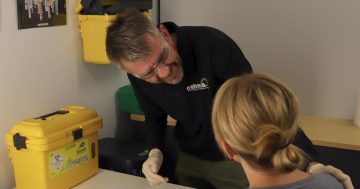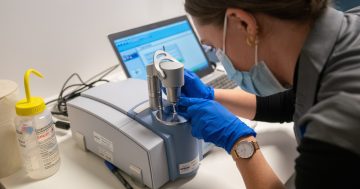
It’s time for the proponents of drug prohibition to take responsibility for their simplistic assertions.
Last week local 2CC radio presenter Marcus Paul and I shirt-fronted one another in a heated discussion concerning the failed world-wide war on drugs. It would be fair to say that we encountered some seemingly irreconcilable differences regarding our stances on illicit drug use. Marcus mentioned at the end of the interview that it was ‘his radio program’ so he would have the final say. Well Marcus, in this here forum not only do I have the final say; I have the only say. So, hold on to your britches and allow me to elucidate to you some facts before I redress the simplistic prejudice that so typifies the civic discourse of Australian talkback radio.
Marcus refused to accept my stance that there is a ‘drug culture’ in Canberra and Australia.
According to the United Nations 2014 World Drug Report, Australia has the highest proportion of recreational drug users in the world. Concurring with the UN, a report on Illicit drug use in Australia by the National Drug & Alcohol Research Centre asserts that 33.6% of Australians have admitted to using cannabis, 9.1% admit to using amphetamines, 7.5% admit to using MDMA, 7.5% admit to using hallucinogens, 4.7% admit to using cocaine, and 1.4% admit to using heroine.
Although Marcus admits to being one of the 33.6 % of Australians who have used cannabis, he asserts that he has never used any other illicit substances, and that back in ‘his day’ a ‘drug culture’ did not exist. What a load of myopic and jingoistic poppycock!
Having grown up without electricity, a flushing toilet, and a piano instead of a television, I silently chuckle when people 10 to 20 years my senior wax lyrical about the good old days. Nonetheless, I digress.
I’m guessing that Marcus might have used an illicit drug of some sort a little more than once or twice, but I’m willing to give him the benefit of the doubt – he’s a decent guy. But Marcus, where were you during the ‘80s and ‘90s; on the f***ing moon? Notwithstanding that if you were a young person during the ‘60s you might well have thought that you were on the moon as a result of a prevalent culture of psychedelic drugs, the ‘80s and ‘90s saw an exponential rise in the recreational use of stimulant and opioid based substances in Australia.
Elected officials have a moral responsibility to make decisions based in the reality within which they legislate, and I would suggest that radio hosts have a responsibility to acknowledge the reality within which they commentate. Unfortunately neither does either. The fact is that people take drugs, and society has a choice: to ignore the facts by imposing criminal sanctions on people who use drugs, or to deal with the facts with compassion, courage, and conviction. And yes, that means regulating all drugs.
In our discussion Marcus proposed that Australia should invest more money into drug law enforcement – as if we haven’t already squandered enough.
According to Harvard Economist Jeffrey Miron, the cost of the war on drugs in the USA, over the past 40 years, has amounted to 1 trillion dollars. And based on federal government statistics our governments spend in excess of 3.5 billion dollars per year, of our money, on combatting illegal drug use. And the days of big spending governments are over?… give me a break.
The legislative prohibition of drugs in Australian has resulted in a $6.7 billion illegal market.
How much more money would you like to see us waste, Marcus? A billion? 10 billion? Approximately 27,000 Australians have committed suicide in the past decade – perhaps we could spend some more money on that.
In 2001, Portugal abolished all criminal penalties for personal drug possession. Drug use did not rise; it fell. Can Australia do the same? I would say, yes we can. I hope for a society marked by freedom and fairness rather than falsehoods and fear, and I’m willing to fight for it – even with you, Marcus.
Regulating all drugs, and educating people of the risks involved in the use of drugs, is the only way that we can protect young Australians from taking dangerous substances – such as party pills cut with Ajax.
I mentioned to Marcus that I aspire to one day having children of my own, and that it is likely that they will at some stage be exposed to risky drug taking behaviour. Marcus retorted: ‘not if you bring’m up right’. In the past fortnight, Georgina Bartter died from a reaction to a party drug at Sydney’s Harbourlife festival. Did her parents not bring her up right? Indeed, did the 3,000 parents who this year lost a child to a drug related incident not bring their children ‘up right’? No, of course they didn’t. But would some of those children still be alive if their substance of choice was regulated and manufactured under controlled conditions? Yes, of course they would.
The discussion on drugs is not progressed by the jingoism of radio hosts who puff the failed policies and conservative ideologues. The discussion on drugs will be progressed by an intelligent and humane public discourse.
Marcus, let me know when you’d like to contribute to such a discussion.
[soundcloud url=”https://api.soundcloud.com/tracks/177383113?secret_token=s-c7ebT” params=”color=ff5500&auto_play=false&hide_related=false&show_comments=true&show_user=true&show_reposts=false” width=”100%” height=”166″ iframe=”true” /]
(Recording from 2CC)





















